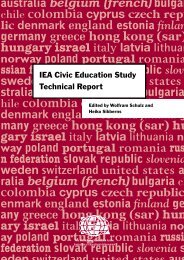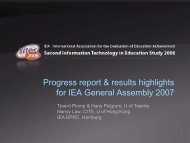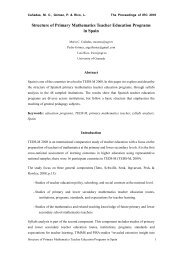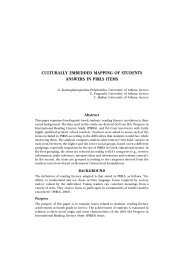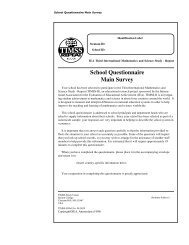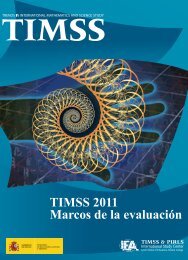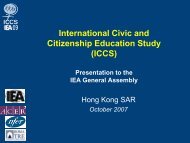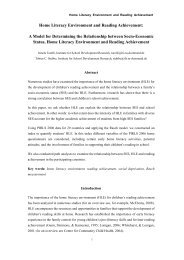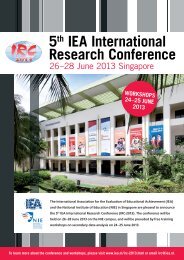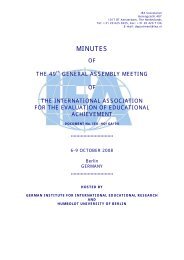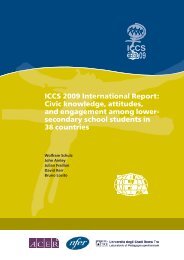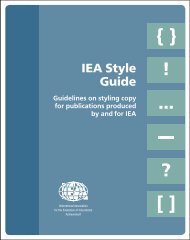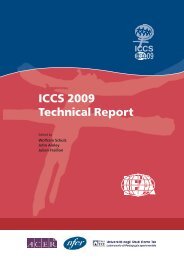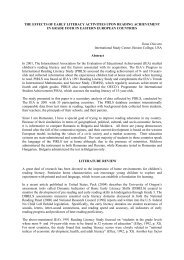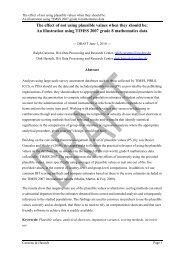International civic and citizenship education study - iccs - IEA
International civic and citizenship education study - iccs - IEA
International civic and citizenship education study - iccs - IEA
- TAGS
- civic
- citizenship
- iccs
- www.iea.nl
Create successful ePaper yourself
Turn your PDF publications into a flip-book with our unique Google optimized e-Paper software.
discipline. In addition, one optional section includes questions for teachers of subjects related<br />
to <strong>civic</strong> <strong>and</strong> <strong>citizenship</strong> <strong>education</strong>. These questions ask teachers for their views on <strong>civic</strong> <strong>and</strong><br />
<strong>citizenship</strong> <strong>education</strong> at school <strong>and</strong> on practices used to teach this subject area at school.<br />
Teacher characteristics: The ICCS teacher questionnaire includes a set of items asking about<br />
teachers’ demographic variables (gender, age) <strong>and</strong> work experience (in general <strong>and</strong> also their<br />
experience inside their current school). The number of years of teaching inside the current<br />
school <strong>and</strong> the holding of specific positions <strong>and</strong> responsibilities are factors that may influence<br />
how teachers consider their own relationship with the school, their sense of belonging to it,<br />
<strong>and</strong> the extent to which they are willing to take an active part in their school community. These<br />
factors are therefore ones that contribute to the openness of the school climate. Variables related<br />
to the teachers’ work experience are subject/s taught in the target grade, years of teaching,<br />
years of teaching in the (current) school, <strong>and</strong> specific positions/responsibilities within the<br />
school (head teacher, coordinator of subject areas, department coordinator).<br />
Teachers’ participation in school governance: The ICCS teacher questionnaire includes a set of<br />
items asking about teachers’ participation in school governance. The items refer to teacher<br />
participation in school representative bodies, to their willingness to take on responsibilities<br />
besides those of teaching, <strong>and</strong> to their participation in drafting the school <strong>education</strong> plans.<br />
The questions also ask the teachers about their participation in <strong>civic</strong>- <strong>and</strong> <strong>citizenship</strong>-related<br />
activities carried out by the school in the community, <strong>and</strong> their personal engagement (that is,<br />
beyond their teaching) in activities of this type. Teacher participation can be seen as a measure<br />
of both the degree of openness of the school management <strong>and</strong> of teachers’ commitment toward<br />
<strong>and</strong> sense of belonging to their respective schools.<br />
Teachers’ confidence in teaching methods: The use of teaching <strong>and</strong> learning methods <strong>and</strong> classroom<br />
management procedures that are primarily learner-centered may contribute to the creation of an<br />
open <strong>and</strong> democratic classroom climate favorable to acquisition of the skills <strong>and</strong> competencies<br />
necessary for active participation <strong>and</strong> for dealing with situations necessitating problem-solving<br />
<strong>and</strong> conflict resolution. Teachers’ confidence in using particular methods <strong>and</strong> procedures relates<br />
to both their professional experience <strong>and</strong> their learning opportunities during their initial<br />
<strong>and</strong> in-service training. Indications in this regard also emerged in CIVED. When asked about<br />
training needs, many of the teachers who participated in this survey expressed their preference<br />
for training in content areas (Losito & Mintrop, 2001). However, teachers of some countries<br />
indicated, as important, pedagogical training related to leading classroom discussions <strong>and</strong><br />
fostering an open classroom climate for discussion.<br />
Because the ICCS teacher questionnaire is addressed to teachers of all subjects, the items<br />
concerning this construct focus mainly on teachers’ general pedagogical knowledge (Shulman,<br />
1987). The teachers’ ability to take on a range of managerial responsibilities within <strong>and</strong> outside<br />
the classroom (“managerial competence”) as well as their recognition of <strong>and</strong> “commitment to<br />
the acknowledgement of the dignity of others [that is, ‘empathy’]” are identified as two of the<br />
dimensions that contribute to defining quality in teaching (OECD, 1994, p. 35).<br />
Teachers’ perception of school climate: The ICCS teacher questionnaire includes a set of items asking<br />
about school climate. The items refer to the school as a democratic learning environment <strong>and</strong> to<br />
the contribution of teachers in bringing about a democratic ethos inside the school.<br />
The teachers’ answers are analyzed in relation to the answers given by the school principals<br />
in the school questionnaire, as well as to students’ answers to a similar question in the student<br />
questionnaire, in order to compare the different perspectives.<br />
ICCS ASSeSSment FrAmework<br />
39



